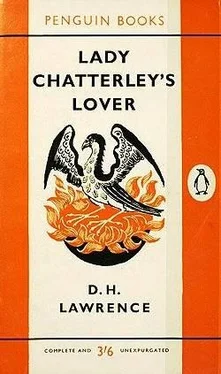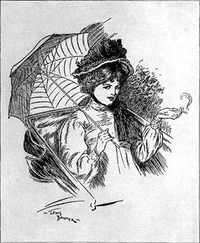When the girls came home for the summer holidays of 1913, when Hilda was twenty and Connie eighteen, their father could see plainly that they had had the love experience.
L'amour avait passи par la, as somebody puts it. But he was a man of experience himself, and let life take its course. As for the mot a nervous invalid in the last few months of her life, she wanted her girls to be 'free', and to 'fulfil themselves'. She herself had never been able to be altogether herself: it had been denied her. Heaven knows why, for she was a woman who had her own income and her own way. She blamed her husband. But as a matter of fact, it was some old impression of authority on her own mind or soul that she could not get rid of. It had nothing to do with Sir Malcolm, who left his nervously hostile, high-spirited wife to rule her own roost, while he went his own way.
So the girls were 'free', and went back to Dresden, and their music, and the university and the young men. They loved their respective young men, and their respective young men loved them with all the passion of mental attraction. All the wonderful things the young men thought and expressed and wrote, they thought and expressed and wrote for the young women. Connie's young man was musical, Hilda's was technical. But they simply lived for their young women. In their minds and their mental excitements, that is. Somewhere else they were a little rebuffed, though they did not know it.
It was obvious in them too that love had gone through them: that is, the physical experience. It is curious what a subtle but unmistakable transmutation it makes, both in the body of men and women: the woman more blooming, more subtly rounded, her young angularities softened, and her expression either anxious or triumphant: the man much quieter, more inward, the very shapes of his shoulders and his buttocks less assertive, more hesitant.
In the actual sex-thrill within the body, the sisters nearly succumbed to the strange male power. But quickly they recovered themselves, took the sex-thrill as a sensation, and remained free. Whereas the men, in gratitude to the woman for the sex experience, let their souls go out to her. And afterwards looked rather as if they had lost a shilling and found sixpence. Connie's man could be a bit sulky, and Hilda's a bit jeering. But that is how men are! Ungrateful and never satisfied. When you don't have them they hate you because you won't; and when you do have them they hate you again, for some other reason. Or for no reason at all, except that they are discontented children, and can't be satisfied whatever they get, let a woman do what she may.
However, came the war, Hilda and Connie were rushed home again after having been home already in May, to their mother's funeral. Before Christmas of 1914 both their German young men were dead: whereupon the sisters wept, and loved the young men passionately, but underneath forgot them. They didn't exist any more.
Both sisters lived in their father's, really their mother's, Kensington housemixed with the young Cambridge group, the group that stood for 'freedom' and flannel trousers, and flannel shirts open at the neck, and a well-bred sort of emotional anarchy, and a whispering, murmuring sort of voice, and an ultra-sensitive sort of manner. Hilda, however, suddenly married a man ten years older than herself, an elder member of the same Cambridge group, a man with a fair amount of money, and a comfortable family job in the government: he also wrote philosophical essays. She lived with him in a smallish house in Westminster, and moved in that good sort of society of people in the government who are not tip-toppers, but who are, or would be, the real intelligent power in the nation: people who know what they're talking about, or talk as if they did.
Connie did a mild form of war-work, and consorted with the flannel-trousers Cambridge intransigents, who gently mocked at everything, so far. Her 'friend' was a Clifford Chatterley, a young man of twenty-two, who had hurried home from Bonn, where he was studying the technicalities of coal-mining. He had previously spent two years at Cambridge. Now he had become a first lieutenant in a smart regiment, so he could mock at everything more becomingly in uniform.
Clifford Chatterley was more upper-class than Connie. Connie was well-to-do intelligentsia, but he was aristocracy. Not the big sort, but still it. His father was a baronet, and his mother had been a viscount's daughter.
But Clifford, while he was better bred than Connie, and more 'society', was in his own way more provincial and more timid. He was at his ease in the narrow 'great world', that is, landed aristocracy society, but he was shy and nervous of all that other big world which consists of the vast hordes of the middle and lower classes, and foreigners. If the truth must be told, he was just a little bit frightened of middle-and lower-class humanity, and of foreigners not of his own class. He was, in some paralysing way, conscious of his own defencelessness, though he had all the defence of privilege. Which is curious, but a phenomenon of our day.
Therefore the peculiar soft assurance of a girl like Constance Reid fascinated him. She was so much more mistress of herself in that outer world of chaos than he was master of himself.
Nevertheless he too was a rebel: rebelling even against his class. Or perhaps rebel is too strong a word; far too strong. He was only caught in the general, popular recoil of the young against convention and against any sort of real authority. Fathers were ridiculous: his own obstinate one supremely so. And governments were ridiculous: our own wait-and-see sort especially so. And armies were ridiculous, and old buffers of generals altogether, the red-faced Kitchener supremely. Even the war was ridiculous, though it did kill rather a lot of people.
In fact everything was a little ridiculous, or very ridiculous: certainly everything connected with authority, whether it were in the army or the government or the universities, was ridiculous to a degree. And as far as the governing class made any pretensions to govern, they were ridiculous too. Sir Geoffrey, Clifford's father, was intensely ridiculous, chopping down his trees, and weeding men out of his colliery to shove them into the war; and himself being so safe and patriotic; but, also, spending more money on his country than he'd got.
When Miss Chatterley—Emma—came down to London from the Midlands to do some nursing work, she was very witty in a quiet way about Sir Geoffrey and his determined patriotism. Herbert, the elder brother and heir, laughed outright, though it was his trees that were falling for trench props. But Clifford only smiled a little uneasily. Everything was ridiculous, quite true. But when it came too close and oneself became ridiculous too…? At least people of a different class, like Connie, were earnest about something. They believed in something.
They were rather earnest about the Tommies, and the threat of conscription, and the shortage of sugar and toffee for the children. In all these things, of course, the authorities were ridiculously at fault. But Clifford could not take it to heart. To him the authorities were ridiculous ab ovo, not because of toffee or Tommies.
And the authorities felt ridiculous, and behaved in a rather ridiculous fashion, and it was all a mad hatter's tea-party for a while. Till things developed over there, and Lloyd George came to save the situation over here. And this surpassed even ridicule, the flippant young laughed no more.
In 1916 Herbert Chatterley was killed, so Clifford became heir. He was terrified even of this. His importance as son of Sir Geoffrey, and child of Wragby, was so ingrained in him, he could never escape it. And yet he knew that this too, in the eyes of the vast seething world, was ridiculous. Now he was heir and responsible for Wragby. Was that not terrible? and also splendid and at the same time, perhaps, purely absurd?
Читать дальше
Конец ознакомительного отрывка
Купить книгу

![Дэвид Лоуренс - Lady Chatterley's Lover [С англо-русским словарем]](/books/26613/devid-lourens-lady-chatterley-s-lover-s-anglo-thumb.webp)










